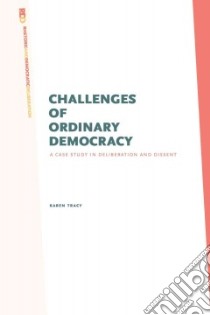Challenges of Ordinary Democracy - 9780271036892
Un libro in lingua di Karen Tracy edito da Pennsylvania State Univ Pr, 2010
- € 58.50
- Il prezzo è variabile in funzione del cambio della valuta d’origine
"The phrase 'ordinary democracy' will forever be remembered because of this scholarly and painstakingly researched case study of the Boulder Valley School District. Drawing on the board meeting minutes, interviews, transcripts, and cable and local news media as her 'text,' Tracy analyzes how local democracy and democratic values are used for good and ill. The role of communication, in all of its forms, both contributes to and undermines the ordinary democracy being played out by the quintessentially American enterprise-the local board of education. One comes away being forever grateful that democracy still does exist in communities across the country because of local school board governance."-Anne L. Bryant, Executive Director, National School Boards Association
"Karen Tracy provides what students of democracy have long needed: a sophisticated, detailed analysis of democracy in practice that bridges the worlds of theory and criticism. Tracy recounts the struggles and triumphs of citizens as they tackle the challenges of ordinary democracy. Anyone who wants to understand the workings of democracy-its promises and pitfalls-ought to read this book."-Robert Asen, University of Wisconsin-Madison
"When we lament the current state of political discourse, we almost always have in mind Washington, D.C., where party platforms, platitudes, and posturing too often substitute for genuine, meaningful debate. In this valuable book, Karen Tracy reminds us that 'ordinary democracy' happens in some fifteen thousand school boards around the country. In these local institutions and others like them, verbal and written exchanges among board members, union officials, parents, the media, and the interested citizenry substantially bear upon the kinds of education that children ultimately receive."-William Howell, Sydney Stein Professor in American Politics, University of Chicago
"In Challenges of Ordinary Democracy, Karen Tracy draws us close to the workings of self-government in modern America. There, we can see the balance that must be struck between deliberative norms of civility and the emotional power of dissent and grievance. Tracy's provocative idea of 'reasonable hostility' as a model for effective local politics will stir controversy, but she will certainly have stimulated more grounded thinking about the complex interactions of officeholders and citizens in free societies."-John Gastil, University of Washington
"This finely observed account of a highly controversial three years in the Boulder Valley (Colorado) School District is a great resource for anyone who wants to understand the forms of democracy in which citizens themselves have a say. These fiesty, conflictual moments, sometimes sparked by a newspaper intent on provoking controversy, pose significant challenges for practitioners of local democracy and scholars of deliberation. The method is worthy of emulation and the theory original and provocative."-Jane Mansbridge, Kennedy School, Harvard University
Is there any place in America where passionate debate plays a more vital role in democratic discourse than local school board meetings? Karen Tracy conducted a thirty-five-month study of the board meetings of the Boulder Valley School District between 1996 and 1999 to analyze just how democracy operates in practice. In Challenges of Ordinary Democracy, she reveals the major role that emotion plays in real-life debate and discerns value in what might easily be seen as negative forms of discourseùvoicing platitudes, making contradictory assertions, arguing over a document's wording, speaking angrily, and attacking people's character. By illuminating this one arena of "ordinary democracy," Tracy hopes to engender a new appreciation for what she calls "reasonable hostility," which can be a desirable ideal of communication for debating public policy issues.
Informazioni bibliografiche
- Titolo del Libro in lingua: Challenges of Ordinary Democracy
- Sottotitolo: A Case Study in the Deliberation and Dissent
- Lingua: English
- Autore: Karen Tracy
- Editore: Pennsylvania State Univ Pr
- Collana: (Hardcover)
- Data di Pubblicazione: 15 Gennaio '10
- Genere: POLITICAL SCIENCE
- Argomenti : School boards Colorado Case studies Public meetings Colorado Case studies Deliberative democracy Colorado Case studies
- ISBN-10: 0271036893
- EAN-13: 9780271036892


